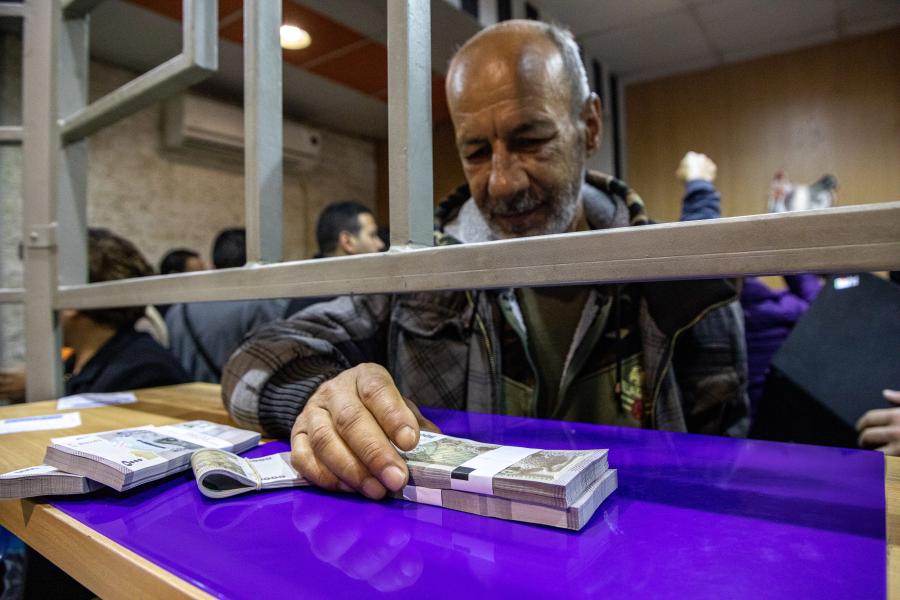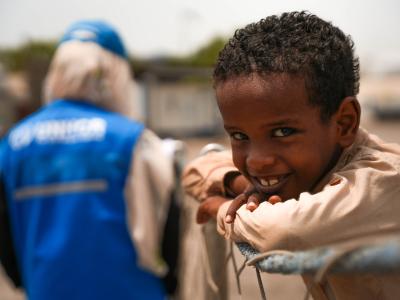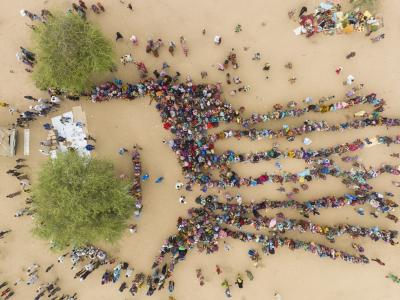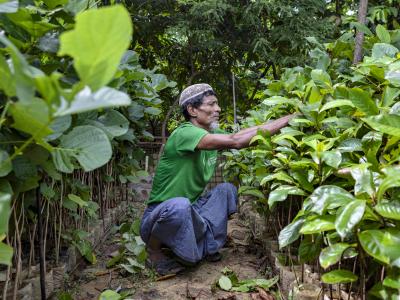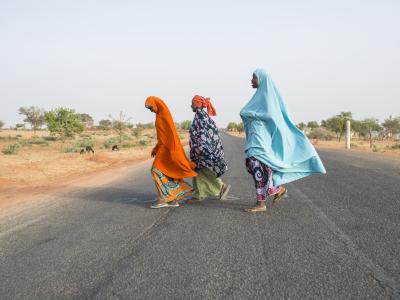Results in 2023
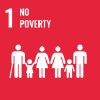
To meet basic needs, including in emergencies, UNHCR distributes cash, a key modality of response, and where that is not possible it distributes core relief items and clean cooking fuel to help people who have been forced to flee from their homes. When local market assessments show it is possible, UNHCR aims to use cash as it is a cost-efficient way of receiving assistance. Having cash to spend also helps forcibly displaced people to participate in the local economy and be included in the society where they live, increasing their economic empowerment, financial inclusion and social protection. UNHCR carries out monitoring and evaluation to ensure the quality of cash assistance and strengthen partnerships, and continually seeks innovative approaches to improve its use of cash.
UNHCR delivered more than $760 million in cash assistance to 7.3 million people in over 110 countries in 2023, principally in Ukraine, the Republic of Moldova, Jordan, Lebanon and Afghanistan. The total amount of cash disbursed fell by more than 20% from 2022, a decrease explained by the exceptional funding of the initial response to the Ukraine crisis in 2022 and by a record shortfall of available funds in 2023. 95% of the cash disbursed was unrestricted, giving recipients the power to choose how to use it.
Where cash assistance was not the preferred modality, UNHCR provided in-kind non-food item (NFI) support to help refugees and other displaced or stateless people meet their basic needs for household and domestic items. Approximately 8.1 million people received basic NFIs in 72 countries, including blankets, sleeping mats, plastic buckets, hygiene/sanitary kits, jerry cans and kitchen sets. Post-distribution monitoring of NFI distributions in several countries underscored the need to continue promoting, when conditions and funds allow for it, a cash-based approach to basic needs assistance wherever possible.
In-kind assistance proved instrumental in several large-scale emergency operations where cash assistance could not be implemented due to the specific nature of the emergencies, such as natural disasters and climate displacements. This included the earthquake in Türkiye and the Syrian Arab Republic, the floods in Libya, and the aftermath of the cyclone in Malawi and Mozambique. Additionally, due to conditions not being conducive for cash programmes, emergency responses throughout the Sudan situation (including Chad, Central African Republic, South Sudan, and Sudan) and the Democratic Republic of the Congo situation were supported with life-saving in-kind assistance, including core relief and shelter items. Under the Sudan Emergency Regional Refugee Response, 299,000 people who had fled to neighbouring countries received in-kind NFI assistance. In addition, 396,000 refugees within Sudan and 164,000 internally displaced Sudanese received in-kind assistance.
The year concluded with the strategic pre-positioning of in-kind assistance in Egypt in anticipation of potential large-scale displacement resulting from the Gaza crisis.
In total, in 2023, with support from governments and private donors, UNHCR delivered in-kind assistance to 16.7 million people, chartering 55 emergency airlifts, and sending more than 31,000 metric tons of assistance by air, road, and sea.
In line with its climate action objectives, UNHCR made significant steps toward improving assistance through sustainable logistics and warehousing practices. This included large efforts in greener specifications for non-food items and investments in sustainable practices throughout its supply chain.
80 UNHCR country operations reported data on distributions of cash and/or non-food items to refugees and asylum-seekers in 2023. In 28 of those countries, the majority of refugees and asylum-seekers received such aid. This was a decrease from 2022 when 45 of the 76 countries reporting data reported that the majority had received such aid. 21 country operations reported on distributions for IDPs in 2023, and 15 of them reported no more than 25% of IDPs received cash and/or non-food items in 2023.
UNHCR’s largest cash and basic needs programme in 2023 was in Ukraine, where UNHCR reached 899,000 people in 22 regions with cash assistance. Most were people from Ukraine’s eastern and southern regions, along the front line of the conflict. UNHCR provided cash for solid fuel purchases to almost 80,000 households with specific vulnerabilities, including households headed by older persons and households with people with disabilities. UNHCR won an award for its innovative use of blockchain technology in the disbursements of cash assistance in Ukraine, providing real time traceability of funds.
575,000 internally displaced Ukrainians, returnees and war-affected people, including in newly liberated areas, received relief items from UNHCR, including bedding, clothes, kitchen sets and hygiene kits. As part of the 2023-24 winterization response, UNHCR helped over 900,000 displaced and war-affected people with cash for winter energy needs, housing and insulation assistance, winterized non-food item kits, winter clothing, generators, and support for winter preparation at collective sites.
Other countries with large cash and basic needs programmes in 2023 included Jordan and Lebanon.
In Jordan, UNHCR and WFP switched to a new targeting model for cash assistance, based on the World Bank 2022 Proxy Means Test, which estimates household poverty. UNHCR transitioned 70% of recipients, and 96% of those in camps, to refugee-owned mobile wallets, making it easier for them to access digital financial services. However, reduced funding meant that refugees faced significant challenges in meeting their most basic needs, and they reported struggling to pay for health and medicines, food and rent especially.
In Lebanon, UNHCR addressed the basic needs of 173,200 vulnerable refugee households with monthly multi-purpose cash and a one-off grant in response to increased vulnerability generated by the conflict in the south of Lebanon. UNHCR distributed core relief items to 51,000 refugee households and 9,286 vulnerable Lebanese households. But underfunding meant that it could not provide any winter cash assistance to vulnerable refugees, and UNHCR and WFP had to stop providing monthly cash assistance to 92,000 families, leaving 30% of eligible vulnerable families without regular cash assistance. Post-distribution and outcome monitoring showed that about 76% of assisted households were still showing expenditure below the minimum survival expenditure basket, and 91% of assisted refugees had turned to harmful coping strategies, including 13% who resorted to emergency coping strategies.
Globally, 95% of the respondents in UNHCR’s post-distribution monitoring (PDM) reported that cash improved their living conditions, compared to 93% in 2022. Cash helped reduce feelings of stress for 95% of the surveyed households, up from 92% in 2022. A clear majority of recipients preferred cash, with only 4% indicating a preference for in-kind assistance. In Ukraine, for example, some people in need, such as older people, were less able to access or less comfortable with the digital technology used in cash transfers, and they preferred in-kind assistance delivered in person.
In line with the drive for the economic inclusion of refugees, UNHCR reached more than one third of beneficiaries with cash through their own bank or mobile money account. Enabling refugee-owned accounts contributes to digital inclusion, which brings a tangible impact to the lives of refugees, including women’s empowerment. Where national regulations did not allow refugees’ access to formal financial services in 2023, UNHCR achieved alternative means for delivering cash, such as pre-paid cards.
73 countries conducted post-distribution monitoring in 2023. UNHCR also published findings on cash from 2022 post-distribution monitoring in Europe and Asia. It also launched multi-year multi-country research in Mauritania, Mexico and the Republic of Moldova, to collect high-quality evidence on the impact of cash.
UNHCR is accountable for cash coordination in refugee settings and co-chairs the Global Cash Advisory Group with OCHA. In line with the transition plan for the new IASC cash coordination model, all 12 refugee settings planned to transition within 12 months have succeeded. For 10 of the 12 Cash Working Groups (CWGs) in refugee settings, UNHCR managed to move to an arrangement with a local co-chair – either from the government or local NGO, with an aim to achieve sustainable arrangements for cash coordination.
Among household-level basic needs that contribute to well-being, UNHCR advocates for clean cooking solutions for forcibly displaced people. In 2023, data from 51 countries where UNHCR operations reported data on primary reliance on clean cooking fuels and technology showed that in 24 of those countries, more than 75% of refugees and asylum-seekers had primary reliance on clean fuels and technology. Among IDPs, seven of the 13 countries reporting data in 2023 reported that less than 25% of IDPs had primary reliance on cooking fuels.
In countries where clean cooking solutions are locally available and accessible, mainly in the Americas, the Middle East and North Africa, UNHCR supports refugees with cash-based assistance. In countries where the host community relies primarily on firewood, UNHCR prioritizes efforts to provide clean cooking programmes. Algeria, Bangladesh and Rwanda are among the leading countries in terms of LPG access for cooking, with UNHCR supporting 142,000 households overall. Djibouti, Mauritania and Niger are also key countries in the implementation of LPG programmes. Ethiopia, South Sudan and Zimbabwe are piloting alternative clean options, such as electricity, solar e-cooking, and biogas. When clean cooking options are unavailable, UNHCR intensifies efforts to provide transitional solutions that are cleaner than firewood, such as the distribution and production of green briquettes and improved cooking stoves. Burundi and Kenya led in those technologies, thanks in part to UNHCR’s collaboration with FAO, while UNHCR reinforced its efforts in Ethiopia, Uganda and the United Republic of Tanzania.
Multisectoral monitoring results

Cash assistance
7.3 million refugees, asylum-seekers and IDPs received cash assistance (110 countries reporting)
2022 result: 9.8 million in 109 countries reporting

Core relief items
8.1 million refugees, asylum-seekers and IDPs received non-food items, including core relief items (72 countries reporting)
Indicator not available in 2022
Core indicators

8.1 Proportion of people who received cash transfers and/or non-food items

8.2 Proportion of people with primary reliance on clean (cooking) fuels and technology
The impact of cash on protection
A study on cash assistance for internally displaced people in Yemen confirmed that unrestricted cash, improving the ability to cover basic needs and debts, has a positive impact on physical safety, deters new displacement and affects the well-being of all household members, including older people. It found that protection outcomes also depend on the cash transfer value and duration.
UNHCR also published learning on cash assistance and child protection from the Republic of Moldova, Slovakia, Bulgaria, Romania, Poland and Ukraine that highlighted ways of using cash as an effective enabler for child protection.
How do people use cash from UNHCR?
UNHCR and other humanitarian agencies have increasingly moved to cash assistance and the use of cash in humanitarian assistance has increased by 41% since 2015.
Studies have repeatedly shown that cash is the most efficient and effective form of assistance. Further, new technology, such as mobile money and digital wallets, makes it easy to send cash directly to displaced populations and promotes financial and digital inclusion.
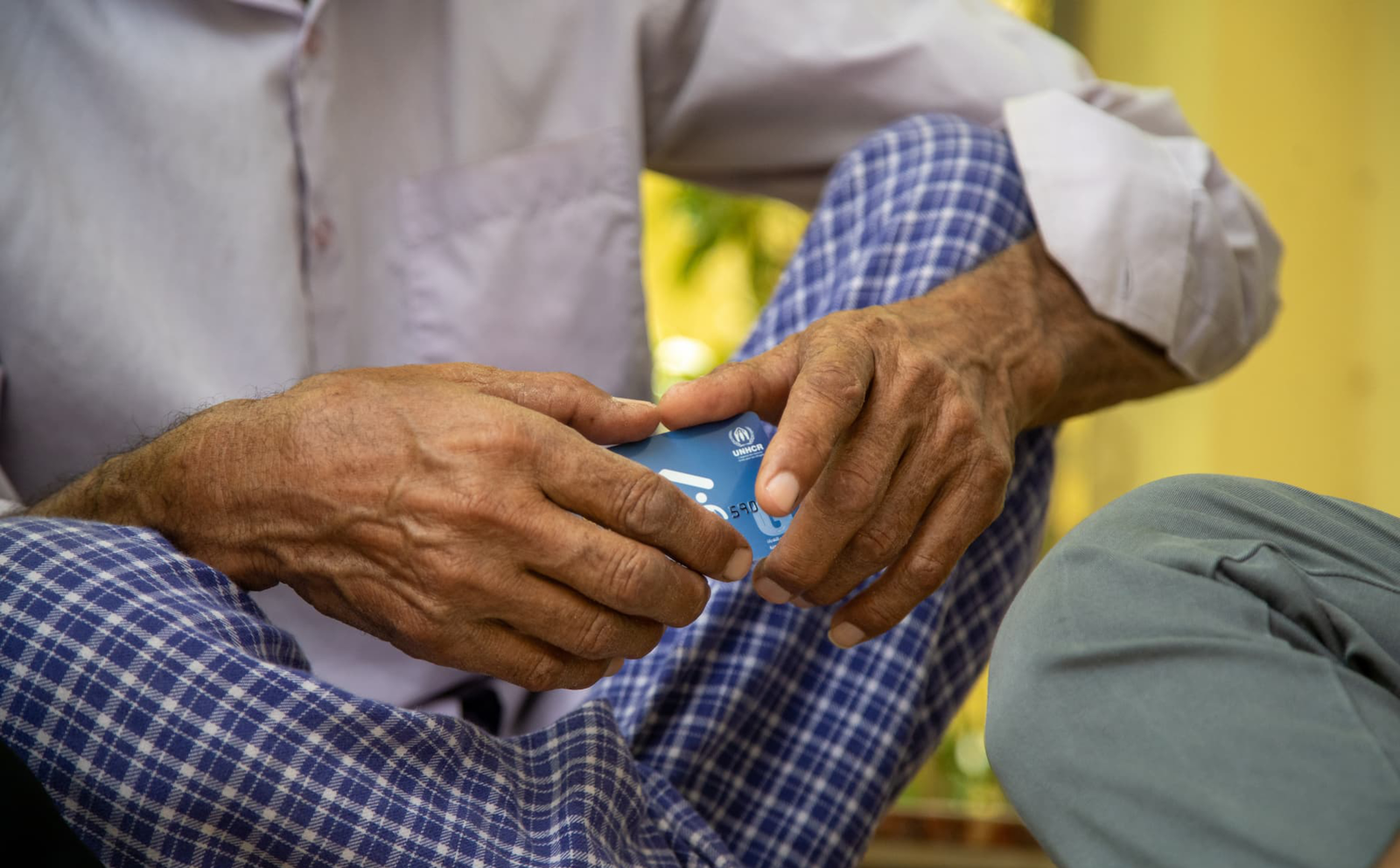
Challenges to achieving outcomes
Shrinking humanitarian funding led to an overall reduction in UNHCR support to help forcibly displaced and stateless people meet their basic needs. While the number of UNHCR operations reporting on the proportion of people receiving cash or in-kind support increased slightly compared to 2022, they were able to assist a much smaller share of the population than the previous year.
UNHCR implemented data-driven, participatory targeting strategies in a range of contexts, such as the Ukraine Situation. These were based on quantitative methods to create vulnerability profiles, alongside the use of community consultations and expert opinion. The Office also continued to work closely with WFP through the UNHCR-WFP Targeting Hub.
While cash undeniably helped displaced people cover their basic needs, major gaps and protection risks remained. Almost 70% of the households interviewed in the cash PDM surveys could meet only half or less of their basic needs, a 5% increase from 2022. 60% of the surveyed households engaged in one or more negative coping mechanisms to meet their basic needs, although that was less than 72% of households in 2022. In 2023, 11% of surveyed households reported some challenges in receiving, keeping or spending cash assistance, a clear decrease from 18% in 2022.
Supporting refugees in camps and settlements to rely on clean cooking fuels and technology remains challenging due to limited funding for cooking needs. Private sector involvement is insufficient, as refugees may struggle to afford cleaner solutions, and market-based options are scarce. The partners that supported the achievement of this outcome were mainly humanitarian actors using humanitarian resources to implement these activities, although a few partners were supported with development financing.
Financial overview
Global expenditure and budget for Well-being and basic needs
$1.203 billion spent against a budget of $2.660 billion
$1.458 billion of unmet needs or 55% of the budget
